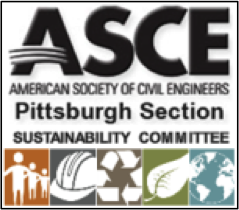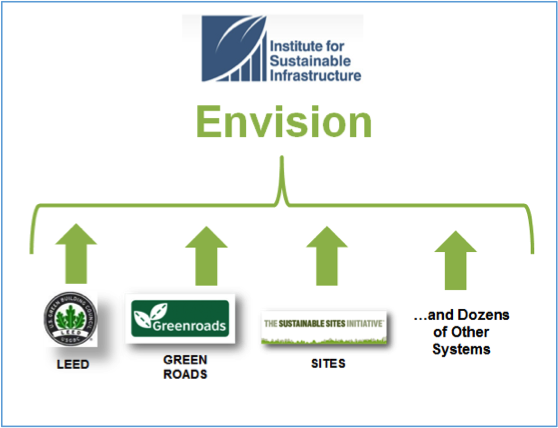Article by Jason Borne and Tom Batroney
 In today’s environment, the conditions and constraints under which infrastructure must perform are becoming an increasing challenge. Examples include an exponentially increasing global population (particularly within urban centers), increased severity in weather patterns and extreme events, and increased consumption of resources (some of which are becoming scarce). All of these challenges are further exacerbated by the poor condition of our infrastructure that we depend on as part of our day-to-day lives, as evidenced in the 2014 Pennsylvania Infrastructure Report Card. To maximize quality of life and minimize costs to taxpayers under these increasing challenging conditions, we need to follow sustainable design principles where possible. Many public agencies and cities are now requiring it. How do we truly evaluate how “sustainable” a project really is? Civil engineers have the answer to this question.
In today’s environment, the conditions and constraints under which infrastructure must perform are becoming an increasing challenge. Examples include an exponentially increasing global population (particularly within urban centers), increased severity in weather patterns and extreme events, and increased consumption of resources (some of which are becoming scarce). All of these challenges are further exacerbated by the poor condition of our infrastructure that we depend on as part of our day-to-day lives, as evidenced in the 2014 Pennsylvania Infrastructure Report Card. To maximize quality of life and minimize costs to taxpayers under these increasing challenging conditions, we need to follow sustainable design principles where possible. Many public agencies and cities are now requiring it. How do we truly evaluate how “sustainable” a project really is? Civil engineers have the answer to this question.
Growing sustainability awareness from the public and clients is bringing about an increased interest in the ability to quantify the financial, environmental, and social impacts within the life cycle of projects. Industry leaders recognized the need for engineers, designers, and related practitioners to be able to evaluate the level of sustainability for all areas of civil infrastructure using an objective and standardized tool. In response to this growing need, the American Society of Civil Engineers (ASCE), the American Council of Engineering Companies (ACEC) and the American Public Works Association (APWA), leveraged their organizations’ support in the creation of the Institute of Sustainable Infrastructure (ISI). The ISI is a 501 (c) (3) non-profit organization, structured to develop and maintain a sustainability rating system for civil infrastructure. That system, called Envision, is a collaboration between ISI in Washington, D.C., and the Zofnass Program for Sustainable Infrastructure at the Graduate School of Design at Harvard University, Cambridge, Massachusetts.
Envision establishes a holistic method to evaluate and rate the sustainability of infrastructure projects while simultaneously considering the entire project life cycle at a systems level, and the values of the community in which the project resides. Prior to the release of Envision, available sustainability rating systems were largely sector specific addressing singular infrastructure elements (such as a building or road) versus a project’s entire contribution to the overall system in which it resides (such as the surrounding community or the below ground sewer and water infrastructure network).
Envision is a comprehensive sustainability rating system that is designed to supplement and complement sector specific rating systems, bringing them consistency and uniformity. Envision does not replace the common industry-accepted sustainability-based systems that currently exist, but provides an overarching framework which allows for the integration of the results derived by these other systems.
The Envision rating system objectives include:
- Improve the performance and resiliency of infrastructure projects from technical, social, environmental, and economic perspectives.
- Stretch traditional design boundaries
- Ensure community and environmental priorities are addressed
- Assess costs and benefits over a project’s expected life cycle
- Guide decisions about investment of scarce resources
 Sustainability assessment methods have historically focused on assessing “sustainable performance”. System efficiency is stressed and consideration is predominantly given to the implications of the project impact on resource use and associated capital and operation and maintenance costs. The guiding mantra being…“Are we doing the project right?” These assessments are typically limited to resource consumption concerns such as energy, water, and recycled material.
Sustainability assessment methods have historically focused on assessing “sustainable performance”. System efficiency is stressed and consideration is predominantly given to the implications of the project impact on resource use and associated capital and operation and maintenance costs. The guiding mantra being…“Are we doing the project right?” These assessments are typically limited to resource consumption concerns such as energy, water, and recycled material.
To have truly sustainable infrastructure, the scope of our perspective regarding sustainability must be expanded to include the “sustainable pathway”. We need to ask ourselves not only “Are we doing the project right?” but additionally address the fundamental question…“Are we doing the right project?” Envision is structured in a manner that brings to light potential design or operational “traps” that may affect how sustainable a project remains over its life cycle. These concerns regarding project resiliency may include 1) resource traps, 2) configuration traps, and 3) standards traps.
For example, project “resource traps” may involve increased community dependence on resources that could become very scarce and expensive.
“Configuration traps” address configurations that are highly vulnerable to extreme weather events, natural disasters, economic conditions and/or actions by others.
“Standards traps” involves the application of design standards and methodologies that are not in alignment with new conditions or concerns.
The Envision rating system for sustainable infrastructure provides an objective and standardized method to begin to address ever increasing infrastructure complexity as civil engineers. The contents of the system provide a systematic way to gauge a project’s level of sustainability and affords infrastructure owners, engineers, and designers an opportunity to develop higher performing solutions by using a life cycle perspective and working with communities in which the project resides. For public infrastructure owners, Envision helps to cut long term costs and keep taxes supporting infrastructure low.
This article is the first of a three part series, providing a comprehensive overview of the ISI Envision sustainability rating system. Part 2 will present the structure and contents of the rating system itself explaining the categories of credits and providing an understanding of the evaluation criteria.
For more information on becoming involved within ASCE Pittsburgh’s Sustainability Committee visit our webpage at http://www.asce-pgh.org/SustainabilityCommittee
